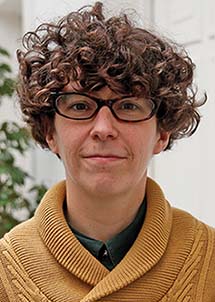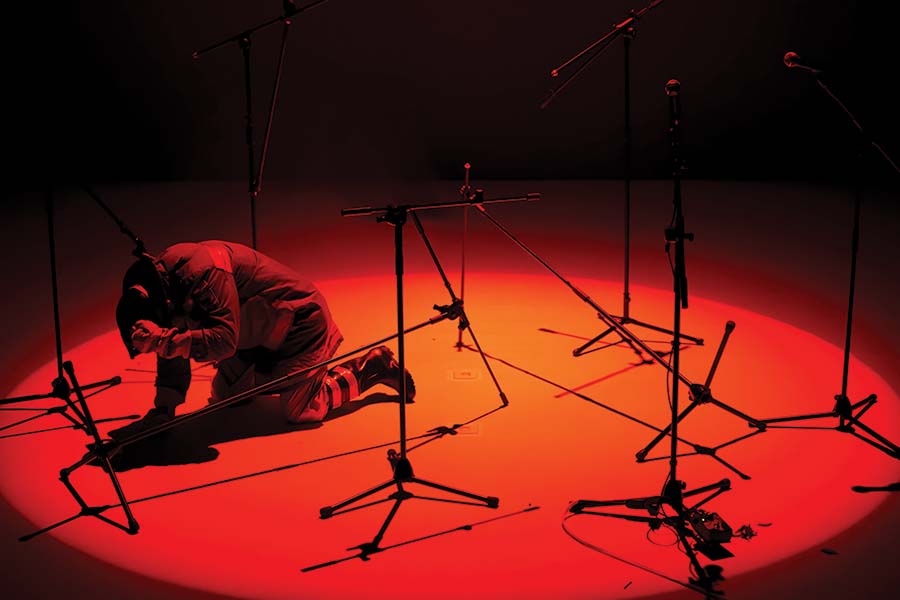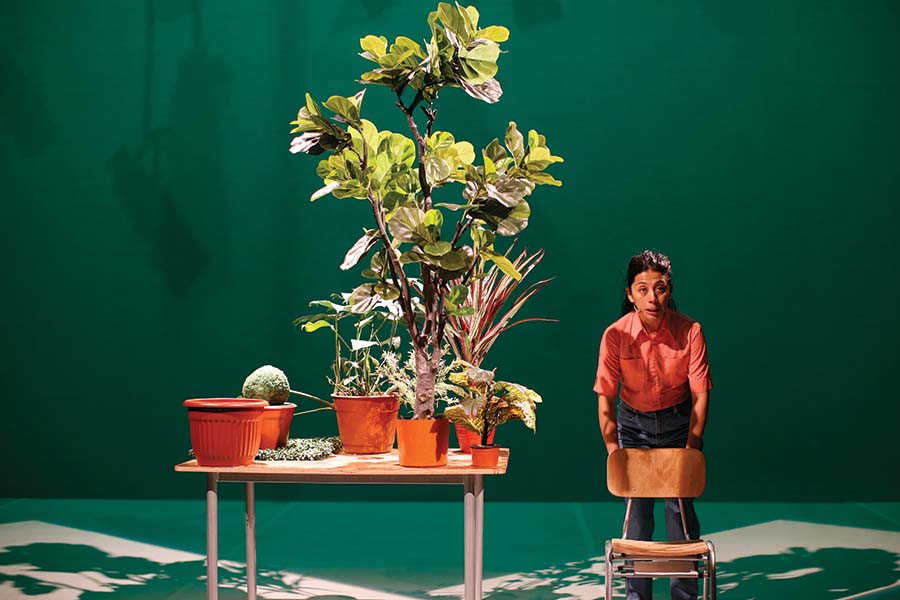A municipal guard walks onstage and starts describing the causes of an accident involving a motorcycle and a tree. He somehow manages to blame the tree for the accident—or, more precisely, he singles out the dissonance between the temporality of the tree and that of the life around it as the cause of the collision. The speed of the world surrounding it, the guard suggests, made the tree’s slow movement almost disappear. “A tree takes centuries to grow, it is slow…so you could say, ‘You should have seen it coming….The storm was coming.’ But I could say, ‘Yes, officer, but you could not see it, this is a coming that cannot be seen.’”
So begins Chilean writer/director Manuela Infante’s Estado Vegetal (Vegetative State). Is this a procedural thriller? Are we going to find out more about the accident? Not exactly. Instead, like that tree, the play slowly starts to grow in multiple directions, bringing onstage a polyphony of voices in a very controlled chaos. While exploring the nuances of the accident through the eyes of the many involved, Infante mines a quotidian anecdote for what it says about the limits of human perception and knowledge, the coexistence of species on our planet, and the possibilities of non-human communication.
A mixture of simple anecdotal events and deeply philosophical inquiries is a signature formula Infante has developed throughout her career, and in the more than 10 plays she’s written and directed. American audiences are getting a chance to see for themselves as Estado Vegetal makes the rounds of several U.S. venues, starting with Austin’s Fusebox Festival (April 17-18), FUNDarte in Miami (April 20-21), Portland Institute for Contemporary Art in Oregon (April 26-27), New York City’s Baryshnikov Arts Center (May 2-3), and Chicago’s Museum of Contemporary Art (May 9-12).

Infante, a leading voice in Chilean theatre for nearly 20 years, began her career with the company Teatro de Chile, then went solo when the troupe disbanded in 2016. She is among a cohort of Chilean theatremakers, which also includes Guillermo Calderón, who mark a generational shift. Born during Pinochet’s dictatorship, which ran 1973 to 1990, she and her peers started their formal artistic education during the first decade of the transition to democracy, and began producing plays by the dawn of the new millennium. Positioning Infante’s work within recent Chilean theatre history not only provides context for her productions; it also serves as an entry point for unpacking her artistic language, her philosophical questions around mimesis and representation, and her explorations of non-human entities.
She made a splash immediately with Prat (2002), her first work as a playwright and director. Indeed the show remains a milestone for Chilean theatre, chiefly because of the scandal that dogged it, making it the most polarizing piece of theatre in recent decades. The play is a fictionalized version of the historic events of the Battle of Iquique in 1879, in which a national hero, Arturo Prat, gave up his life at the age of 31 for the motherland fighting the Peruvian navy. Though the eponymous character is a historic figure, Prat does not aim for historical accuracy, depicting Prat as a frightened teenager on a ship, where he faces the decision to sacrifice himself for his country.
The play evolved from an exercise performed by a group of young acting students, and won a college theatre festival in 2001; only then was it developed into a full-length play with the help of public funding. While very few people actually saw the show, its less-than-hagiographic portrait of a purported national hero generated an intense public debate on national TV and in Congress, sparking questions about the value of an identity based on a militaristic past, the heteronormative construction of historic narrative, and the fragility of the transition from dictatorship to a democracy. When Infante and her colleagues later dubbed their company Teatro de Chile, the official-sounding name was meant ironically, and the subject matter of their subsequent work was less concerned with the nation per se than with some of the same questions they’d explored in Prat.
Juana (2004), for instance, underlined the fictional invention involved in writing history. Set in France in 1920 on the day that Joan of Arc is canonized, the play depicts a gang of poor children who decide to play a game in which they pretend to be the French martyr and reenact moments of her life. Through this trifold mediation—moving the action to a different country and epoch, telling the story through the eyes of children reflecting on their country’s past—Juana, like Prat, interrogated the construction of national myths, the role of history in creating nationalism, and the effects of war in the lives of simple people.
For Infante, theatremaking sits between two other interests: philosophy and music. She received an M.A. in cultural analysis at the University of Amsterdam, and in 2010, she formed the indie-pop band Bahía Inútil. “I think theatre brings together music and philosophy,” she told the writer Alejandra Costamagna in 2018. “Because theatre is pure rhythm, it happens as an unfolding of rhythm through time and space, and at the same time theatre is pure idea. Theatre is a complex system.”
Infante thus conceives of plays as a way of thinking, a path to an irresponsible philosophy that puts intellectual discourse to the test onstage, making it sensible—in the Kantian sense of apprehensible, legible. A specific mixture of complex ideas explored through bodies, rhythm, and storytelling onstage often results in compelling and attractive scenic compositions that can tackle philosophical questions without didacticism or preconceived answers, inviting the audience on a journey of performative thinking.
This intellectualized physicality, or physicalized intellect, if you will, was the driving force behind another very ambitious project by Teatro de Chile. Using a system of collaborative creation that the troupe had developed over the years, they embarked on scenic research about Jesus as a historic figure that was heavily mediated through writing, visual arts, and film. The result was Cristo (2008), which on the intellectual plane set out to test the limits of reality and representation, thinking through the ideas of such philosophers as Jean Baudrillard, Gilles Deleuze, and Jacques Derrida. On a performative level this was delivered in an anecdotal tone, via naturalistic acting, making the play highly diverting, visually attractive, and relatable for audiences.
As you can see, Infante’s intellectual references are mostly European philosophers. But her relationship with Europe and theatre has been built primarily in practice: in touring, receiving multiple commissions from European entities and festivals, and doing artistic residences at international cultural centers, such as Robert Wilson’s Watermill Center in New York in 2011 and 2015. In 2012 she was invited to create a play in Germany on the occasion of the bicentennials of several Latin American countries. Infante and Teatro de Chile produced Don’t Feed the Humans, a play mixing theatre and lecture performance (as they had a year earlier in Loros Negros) in which a scientist brings the last surviving specimens of a fictional tribe from the south of Chile to Germany. The play premiered at Berlin’s Young Latin American Theatre Festival, alongside the work of other Latin American theatre artists, including Argentina’s Lola Arias, but it challenged the very frame of its presentation. Don’t Feed the Humans suggested uneasy parallels between the colonial practice of creating human zoos and the contemporary international circulation of thea-tre from non-European countries. In 2013 the play Zoo expanded on one aspect of this comparison, looking squarely at the history of those human zoos—i.e., exhibitions of Indigenous people in cages in Europe and the U.S. at the turn of the 19th century. Zoo zeroed in on the paradoxes and limits of theatrical representation, the place of language in the production of knowledge, and the construction of Otherness.
The company’s last play was 2016’s Realismo, which emerged from a series of artistic residences, including one at Watermill. Realismo began to point the way to Infante’s current preoccupations. In attempting to address the question of how theatre might be done within a post-anthropocentric paradigm, Realismo connects different generations of a family by means of a serial dramatic structure. Each scene deploys variations of the realistic acting tradition, while the disturbance of what can be understood as reality gradually escalates, until the final moment, when humans are displaced from the stage and the scene is fully controlled by inanimate objects.

Even when Infante was billed as the playwright and director, the methodology of Teatro de Chile was deeply collaborative. The dramaturgy of the troupe’s spectacles was the result of scenic exercises, explorations, and improvisations by actors under Infante’s guidance. While this might be understood as a natural consequence of her using the stage to reflect on and test ideas, it also means that her plays contain a multiplicity of voices.
After the dissolution of Teatro de Chile, Infante started writing texts for other people to direct: In 2017 there was El corazón del gigante egoísta (The Heart of the Selfish Giant) and Ayudándole a sentir (My Condolences), both directed by Juan Pablo Peragallo. And she in turn has recently directed plays by others, such as Luis Barrales’s Xuárez (2015) and Roland Schimmelpfennig’s Idomeneo (2019).
Even without her longtime Teatro de Chile collaborators, Infante has continued to push the limits of an epistemology centered on the human experience in performance. It was during a residency at the Baryshnikov Arts Center in 2016 that she began to create Estado Vegetal, a one-woman show in which actor Marcela Salinas brilliantly incarnates the array of characters, human and non-human, involved in that motorcycle/tree accident. Expanding on the writings of Michael Marder, whose work focuses on phenomenology and environmental philosophy, and the plant-neurologist Stefano Mancuso, Infante has created a performative reflection on pressing and timely questions—about the challenges of living on our planet, understanding the human species as just one among an infinite number of species on Earth, the existence of non-anthropocentric languages, the production of knowledge by species other than humans, and the improbability of communication between humans and plants.
You might say that her work, cultivated over years in many kinds of soil, is continuing to grow.
Fabian Escalona is a Ph.D. candidate in theatre and performance at the Graduate Center, City University of New York.





